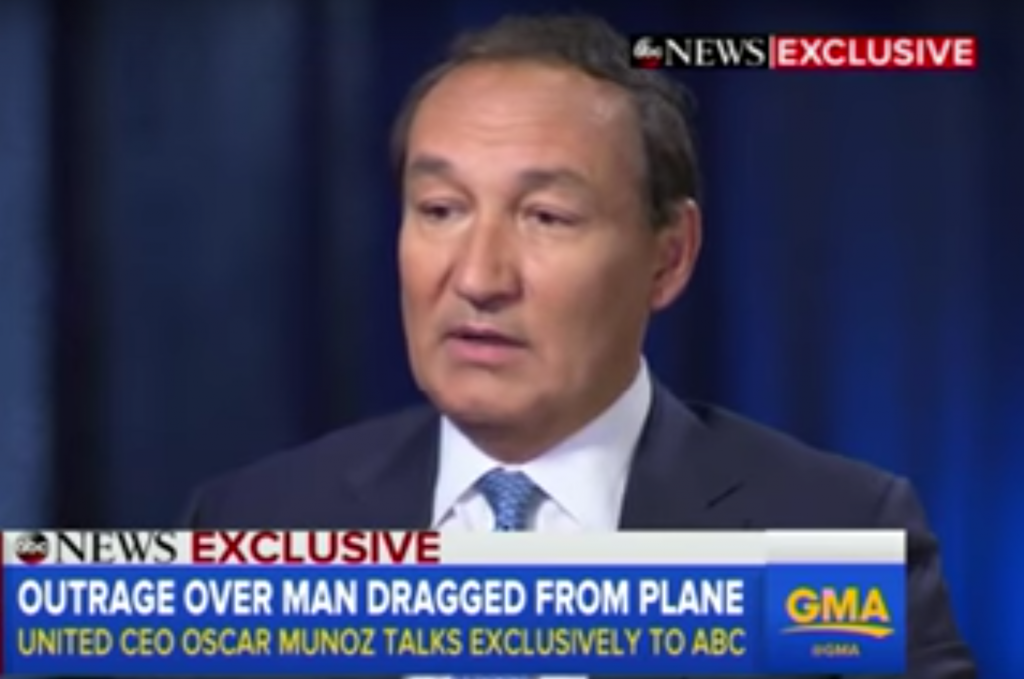United Releases Internal Report on What Happened in Violent Chicago Incident

Photo Credit: United Airlines is making several changes in how it responds to customer complaints. Good Morning America
Skift Take
This has been a rough two and a half weeks for United, which was clearly caught off guard by the fallout from this now-famous April 9 incident. It will be some time before the airline regains its footing, but perhaps this report is a step in the right direction.
United Airlines will not remove passengers already seated on an airplane unless safety or security is at risk, one of several policy changes the airline detailed on Thursday, two and a half weeks after United employees in Chicago called security officers to force a customer off a regional jet because the airline needed seats for crew members.
By now, the story of United passenger David Dao is known almost everywhere, including in China, where the incident trended on Weibo, the popular social media site.
On April 9, Dao had boarded a United Express flight operated by Republic Airlines from Chicago O'Hare to Louisville, Kentucky, when he and three other passengers were told they would have to leave so four late-arriving crew members, all of whom worked for Republic Airlines, could board. The crew was needed to fly the next morning from Louisville to Newark, and the flight they had planned to take from Chicago was delayed. The other passengers agreed to get off, but, Dao, a doctor, said he needed to return home to treat patients. After Dao refused, United called airport security, which dragged him off the plane and seriously injured him. The story went viral after another passenger took video, and Dao, who later taken to a hospital, is preparing a lawsuit.
United CEO Oscar Munoz promised the airline would produce a report by April 30, and on Thursday United released it. It contains 10 customer-oriented changes the airline is making, including two — United will not call security or police except for issues related to safety and security, and will not permit employees to fly on full flights unless they book at least 60 minutes in advance — that the airline had previously outlined.
United released the report one day after it provided similar detailed information about the flight to the U.S. Senate Committee on Commerce, Science and Transportation, which has been investigating the incident.
Overbooking changes
Many of United's changes involve tweaks to how the airline manages flights when it needs to remove customers because it does not have enough seats for all paid passengers.
Like most carriers, United sometimes sells slightly more tickets than seats, and often that's not a problem, because usually not all passengers show up. And even when United has more passengers than seats, it's generally an easy problem to fix, because the airline asks for volunteers, many of whom happily take another flight in exchange for several hundred dollars in travel credits. But on some flights, United does not find volunteers and must require passengers to get off the plane. That's allowed under federal law if United offers compensation, capped at $1,350. But some customers do not like being told they cannot board airplanes, even when they receive cash or vouchers.
Dao's incident was not a traditional overbooking situation since United needed his seat for an employee, not another fare-paying passenger. But United on Thursday said it is nonetheless changing its protocol and will avoid aggressively overbooking some flights. Specifically, United will limit overbooking on flights on which, historically, the airline has had trouble soliciting volunteers to take other flights. United said it will be careful about overbooking the last flight of the night, because passengers generally don't like being told they cannot fly until the next day. (A small number of airlines, including JetBlue Airways, do not overbook flights at all, but United did not choose that approach.)
United, like its competitors, also often has to bump passengers for other reasons, such as when it substitutes a smaller aircraft at the last minute, or when the airline calculates an aircraft is too heavy to fly a route. That happens sometimes when the weather is poor. "As an example," United said, "when winter snowstorms result in a runway with snow at the departure airport, a reduction to the maximum takeoff weight for the aircraft may be required."
That means, even with the changes to its overbooking policies, United still will tell some passengers they cannot fly. But the airline said Thursday it will offer more generous packages to customers, with agents authorized to give displaced passengers up to $10,000 in travel credits, if the airline needs their seat for other reasons. After United's incident, Delta Air Lines raised its cap to $9,950.
More money may have helped in the Dao situation. United said Dao and other passengers were only offered only $800, plus hotel accommodations and meal vouchers. Everyone declined the offer, United said in the report. At one point, the airline said one passenger was willing to leave for $1,000, but at the time, the airline needed more than one seat. Still, United probably could have found more volunteers had it raised its offer even by a few hundred dollars.
"Agents did not have the authority to act independently and authorize higher levels of compensation or provide other modes of transportation and/or the right destination options," United said in the report.
Employee training and empowerment
Additionally, United will make changes in how it trains it customer-facing employees, who previously received no regular courses on how to handle challenging incidents. Beginning in August, they'll receive annual training to help them handle "the most difficult of situations," the airline said.
Further, United said employees will be more empowered to fix problems. Flight attendants and airport agents soon will have a mobile app they'll use for compensating customers when things go wrong. United also said it will create a "customer solutions team," that will look at "creative" ways to get passengers and airline crews where they need to go, even when United oversells flights.
In a separate matter, United said it is changing its policy on permanently lost bags. Starting in June, if a bag is gone forever, United promises a new, "no questions asked" policy, in which it will pay customers at least $1,500. Passengers can get more money from the airline, but they may have to provide receipts. Bags don't often disappear forever — they're usually just temporarily lost — but it happens on occasion.
Here's the full United report:
[gview file="https://skift.com/wp-content/uploads/2017/04/United-Flight-3411-Review-and-Action-Report.pdf"]
And here is a link to the full report to the Senate:
[gview file="https://skift.com/wp-content/uploads/2017/04/United-Report-to-U.S.-Senate.pdf"]

